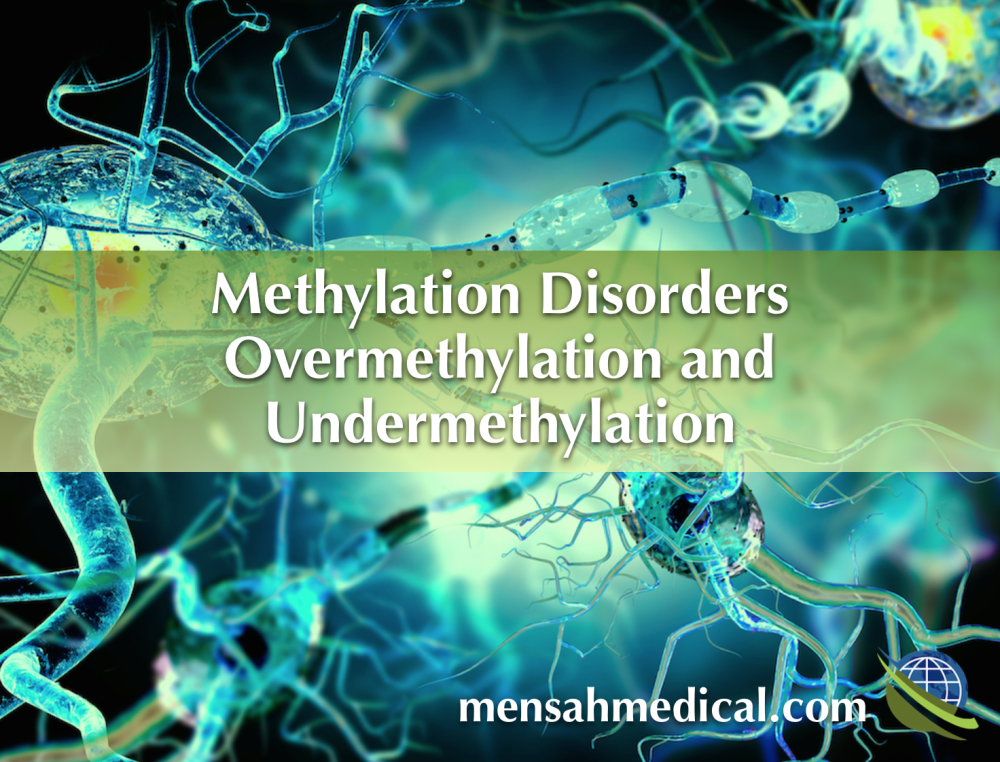Methylation disorders are often closely associated with mental illness. When the methylation system is properly balanced the symptoms of mental illness will wane. Genetic mutations can cause abnormalities in the body’s methylation cycle. The methylation cycle is a series of biochemical pathways, interdependent, and often easily misunderstood. They influence critical biological processes such as DNA maintenance, energy production, detoxification, and immune system function. When the body’s methylation pathways are out of balance 0n one level, they negatively effect neurotransmitter activity and development. When there are problems with methylation over or under production of certain neurotransmitters are often associated with dysregulated emotional states. Here at Mensah Medical we evaluate the various patterns seen with methylation disorders. Certain distinct psychiatric symptoms tend to consistently appear in overmethylated patients versus undermethylated patients. (Let’s not forget that most individuals have perfectly normal functioning methylation pathways.)
Methylation Disorders: Over and Under Methylators
A number of people suffer from methylation disorders. What is methylation? It is is an epigenetic pathway used by cells to control gene expression. This is an important job. Methylation is the process by which methyl molecules are added to enzymes, hormones, and neurotransmitters as well as to DNA itself. This can impact physiological and psychiatric issues such as mood, memory, concentration, and sleep. It can impact development from conception through to birth as well as the development of future conditions decades later, such as schizophrenia or Alzheimer’s disease. It’s a virtual epigenetic timer for both normal functioning and abnormal processing. For example, it is from this process that melatonin (which helps us sleep), is made.
During the methylation process methyl groups get added to our DNA. The methylation cycle is found in all the cells of the body except for our red blood cells. It regulates many substances that are necessary for the body to function. For the methylation cycle to work properly, our bodies need an appropriate balance of certain nutrients. If they are either not available, or if some cases overly abundant, we may see the development of methylation disorders. Targeted advanced nutrient therapy can correct many of the challenges posed by methylation disorders.
Wondering if you are undermethylated or overmethylated? There are common symptoms found in patients with methylation disorders. We use specific lab testing in our office to discover abnormalities in patients’ methylation cycles and to treat these imbalances naturally through individualized, targeted, advanced nutrient therapy.
Methylation Disorders: The Undermethylated Person
Undermethylation is formally referred to as histadelia. This condition has too few methyl groups (a carbon group with three hydrogen atoms) which help regulate neurotransmitter activity. This can lead to perfectionism, high accomplishment, and high achievement (overdrive). Undermethylated patients may benefit nicely from Paxil, Zoloft, and other serotonin-enhancing medications, although nasty side effects are common.
You may be undermethylated if you are a perfectionist and highly competitive. Many undermethylated persons in the general population tend to be high-achievers and have good mental health. These people tend to be our doctors, lawyers, educators, secretaries, corporate executives, professional athletes and scientists who strive for high career accomplishment. Common to each of these is the perfectionist tendency prompted by undermethylation.
Methylation Disorders: The Overmethylated Person
Overmethylation is also called histapenia. Overmethylated patients have elevated levels of serotonin, dopamine, and norepinephrine, low whole blood histamine, and low absolute basophils. Anxiety and depression are the main symptoms of overmethylation, at times the symptoms can be severe enough to cause a state of confusion.
Patients with overmethylation are often very creative, artistic, and musically inclined. Academically, overmethylated persons tend to excel in areas of high interest and lag in other areas. Most overmethylated persons are very passionate individuals and often self sacrificing. These individuals may be attracted to professions or hobbies in music and the arts, theater, acting, social services or causes, and philosophy. They often march to the beat of their own drum.
Many persons who suffer from anxiety and depression may also be overmethylated which often correlates with high levels of dopamine, norepinephrine and serotonin.
Seeking Treatment for Methylation Disorders
It is dangerous to self diagnose methylation disorders. If you suspect you are either undermethylated or overmethylated contact our clinic for an evaluation.
Albert Mensah, MD
 As a physician in this specialized field since 2005, Dr. Mensah, board certified in integrative pediatrics by the American Association of Integrative Medicine, has treated over 3,000 patients with advanced targeted nutrient therapy. He serves on the board at Walsh Research Institute and serves as a clinical instructor for WRI’s international doctor training programs around the world. Dr. Albert Mensah received his undergraduate degree from Northwestern University (Evanston, Illinois) and his medical degree from Finch University of Health Sciences-Chicago Medical School. Dr. Mensah’s residency was in Family Medicine at Swedish Covenant Hospital (Chicago). Following residency, he completed additional fellowship training in academic development at JHS Cook County Hospital (Chicago). From 2005 to 2008, Dr. Mensah treated patients at the former Pfeiffer Treatment Center, a not-for-profit organization and outpatient clinic specializing in the treatment of biochemical imbalances including children with autism. Prior to joining Pfeiffer, Dr. Mensah was a physician at Melrose Park Clinic in Illinois. Dr. Mensah co-founded Mensah Medical in 2008 with Dr. Judith Bowman.
As a physician in this specialized field since 2005, Dr. Mensah, board certified in integrative pediatrics by the American Association of Integrative Medicine, has treated over 3,000 patients with advanced targeted nutrient therapy. He serves on the board at Walsh Research Institute and serves as a clinical instructor for WRI’s international doctor training programs around the world. Dr. Albert Mensah received his undergraduate degree from Northwestern University (Evanston, Illinois) and his medical degree from Finch University of Health Sciences-Chicago Medical School. Dr. Mensah’s residency was in Family Medicine at Swedish Covenant Hospital (Chicago). Following residency, he completed additional fellowship training in academic development at JHS Cook County Hospital (Chicago). From 2005 to 2008, Dr. Mensah treated patients at the former Pfeiffer Treatment Center, a not-for-profit organization and outpatient clinic specializing in the treatment of biochemical imbalances including children with autism. Prior to joining Pfeiffer, Dr. Mensah was a physician at Melrose Park Clinic in Illinois. Dr. Mensah co-founded Mensah Medical in 2008 with Dr. Judith Bowman.
